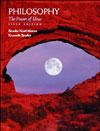 |  Philosophy: The Power of Ideas, 5/e Brooke Moore
Kenneth Bruder
The Eighteenth and Nineteenth Centuries
Key ObjectivesUpon completing this chapter you should be able to:
1.Describe the fundamental elements of David Hume's epistemology. |
 |  |  | 2.Explain why Hume's theory of knowledge undermines claims about physical objects, the self, and cause and effect. |
 |  |  | 3.Show how Immanuel Kant's epistemology gets around Hume's skepticism about the world as experienced. |
 |  |  | 4.Explain why Kant is still a skeptic when it comes to knowledge of a world beyond experience. |
 |  |  | 5.Describe the basic features and main themes of G. W. F. Hegel's absolute idealism. |
 |  |  | 6.Explain the main ways in which Kierkegaard, Schopenhauer, Freud, and Nietzsche each reacted to Hegelian metaphysics. |
|



 2002 McGraw-Hill Higher Education
2002 McGraw-Hill Higher Education